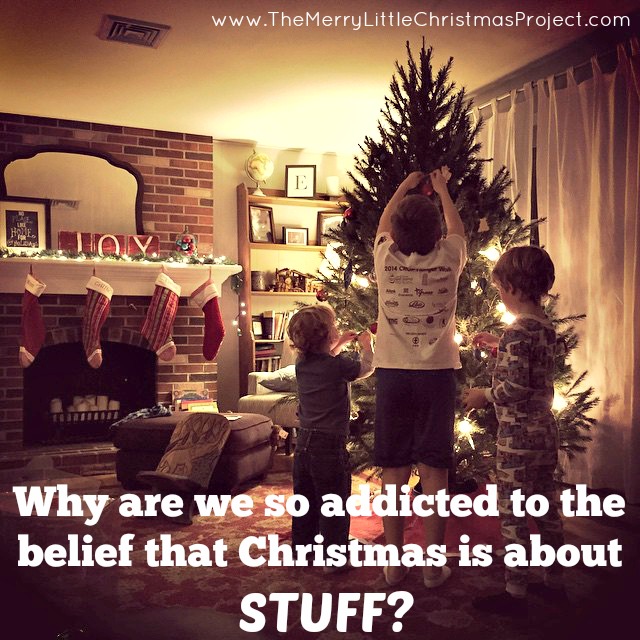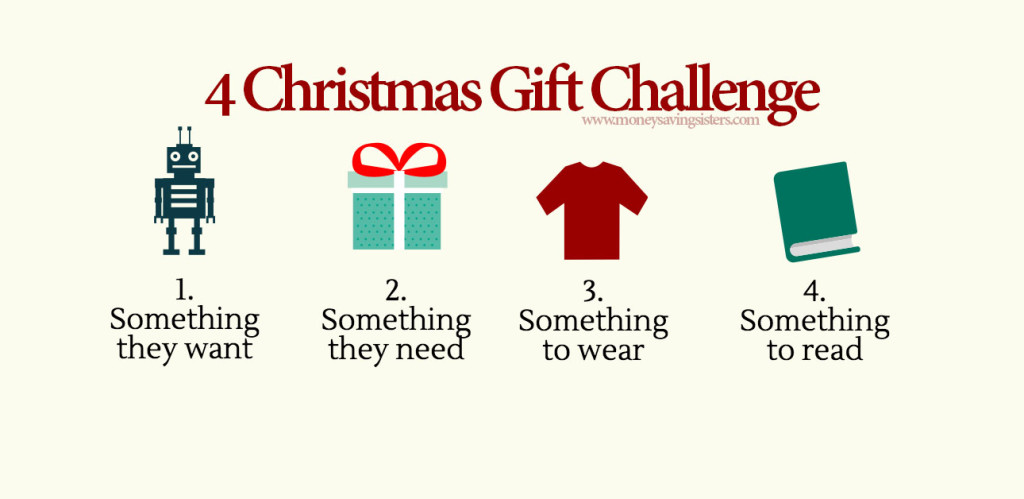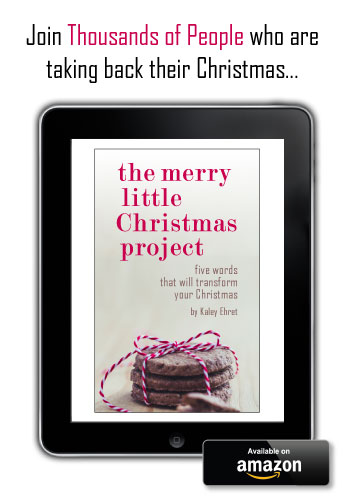
“Look, Charlie, let’s face it. We all know that Christmas is a big commercial racket. It’s run by a big eastern syndicate, you know.”
-Lucy Van Pelt (A Charlie Brown Christmas, 1965)
The following is an excerpt from my book The Merry Little Christmas Project.
The 1994 version of Little Women is one of my all-time favorite movies, and I particularly enjoy watching it at Christmastime. In one of the opening scenes, Meg, Jo, Beth and Amy March praise the Christmas breakfast that their beloved housekeeper Hannah has managed to gather for them in spite of the wartime poverty they are experiencing.
“An absolute Christmas miracle!” Meg exclaims.
“Isn’t butter divinity?” Amy gushes.
Something tugs at my heart every time I watch this scene. I think it may be a twinge of jealousy. I am jealous of their gratitude for such simplicity.
I want to be that grateful for butter on Christmas morning.
My, how times have changed. According to an article released by MSN in 2011, American parents now spend an average of $271 per child on Christmas gifts alone.
I’m going to take a wild guess that these are the same parents that are complaining about the clutter that has overtaken their home on December 26th.
Why are we so addicted to the belief that Christmas is about stuff?
Honestly, I don’t know who the first person was to introduce the idea of a consumeristic Christmas, but I’m confident that the arrival of the Sears Christmas catalog and the evolution of television and internet marketing strategies have perpetuated the ongoing myth that we owe our kids stuff at Christmas.
I can say with certainty that Black Friday’s gradual takeover of Thanksgiving Day reflects brilliant marketers strategizing every possible method to get you to spend more money – not less, as they so cleverly like to advertise.
Also. Can we discuss the elephant in the room? Furby, Tickle-Me Elmo, Cabbage Patch Kids, Teddy Ruxpin, Beanie Babies, Zhu Zhu Pets. THESE are the toys that have caused mass parental panic and nationwide shopping frenzies over the years?
America, come in close. I love you, but this is so disappointing.
I need some answers. Why did no one have the presence of mind to say, “HOLD THE PHONE. These things are ugly and I’m afraid they might be staring at me while I’m sleeping”? Why did no one call those sneaky advertisers’ bluff and say, “we don’t want your creepy toys”?
I’m blowing the whistle and calling foul, America.
Christmas marketing is a finely-tuned multi-billion-dollar instrument, with every advertiser fighting to get a bigger piece of the pie. This is why Christmas decorations and gifts are set up next to back-to-school displays at Walmart, and Christmas commercials emerge before the leaves even start changing colors.
Let’s face it. Lucy was right. Christmas really is a big commercial racket.

On the other hand, I think giving is beautiful.
In spite of my misgivings about making Christmas all about the presents, I find beauty in giving at Christmastime. I want to see my son’s face light up when he recognizes that I know and care about what he likes. I love to watch my husband’s smile go from cheek to cheek when he sees that I’ve got him great products and gadgets. I love to view the interactions between my children when they present their gifts to each other. I enjoy letting my friends, neighbors and children’s teachers know that they are valued and appreciated.
So the question becomes: how do I honor the tradition of gift-giving at Christmas without becoming another victim of our culture’s advertising schemes? How do I turn giving into a meaningful experience and not just an obligation?
Permission
I’ve realized that the first step is giving myself permission to cut back. Here are some hints that there is room for cutting back on gift-giving:
? You are worried that your child will be devastated that his friends got a newer, better, cooler version of the latest hottest technology – and you’re referring to your 4-year-old.
? You feel troubled over whether or not your personalized, stenciled and crocheted teacher’s-survival-kit-in-a-mason-jar gift is Pinterest-y enough to impress all three of your children’s teachers, not to mention the student versions you send for each of your children’s classmates.
? The number of people on your list of gift recipients rivals that on Santa’s.
? You were one of the parents fist-fighting in Walmart over Beanie Babies.
? You’ve ever felt like you should cut back on gift giving at Christmastime.
If you fit any of the descriptions listed above, I’m giving you permission to cut back this year. Here are three ideas that might just make giving a more meaningful experience for you this year:
Experiential gifts:
Experiential gifts are the best kinds of gifts, in my opinion.
Not only do they reduce the clutter associated with Christmas, but giving the gift of an experience allows the recipient to extend the joy beyond Christmas morning.
There are so many variations on experiential gifts – the options are endless!
The Rule of ONE:
I have a love-hate relationship with Pinterest. I love the endless supply of creative, clever and crafty ideas for gifts. On the other hand, I hate the endless supply of creative, clever and crafty ideas for gifts. It can all get a little overwhelming.
But what if, instead of feeling like you need to actually use all 1.2 million ideas that you pin, you choose just one that will be your go-to gift for neighbors, teachers, and friends? Chances are, they aren’t all going to get together to compare notes, so why not?

I filled these jars with M&M’s a few years ago as gifts for neighbors and teachers.
I don’t think anyone minded.
The Three (or Four!) Gifts of Christmas:
This method of gift-giving has gained some popularity in recent years. Inspired by the idea that Jesus received three gifts when He was born – gold, frankincense, and myrrh – many parents have opted to limit their children’s gifts to just three. Others use the four gift rule – which includes “something you want, something you need, something to wear, something to read.”

Read more about this idea here.
As I’ve given myself permission to simplify gift-giving and focus on more meaningful gifts, I’ve discovered something. By giving my children less stuff, I’m able to give them more of me. And quite honestly, I think that’s what they actually wanted in the first place – even if it doesn’t make their Christmas lists.
How are you giving yourself permission to cut back this year?

AMEN! Well said now for me to follow thru!
Thanks, Jane! You can do it. 🙂